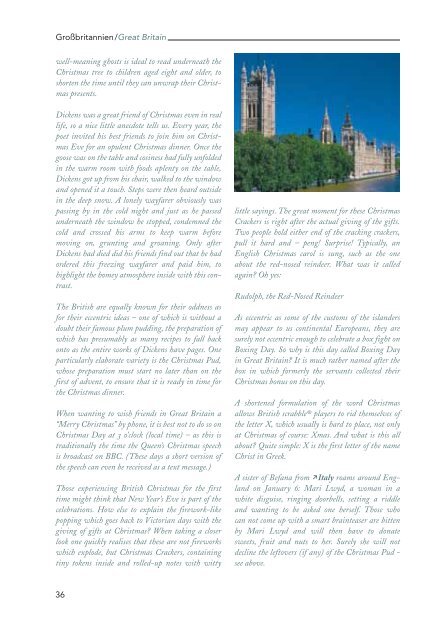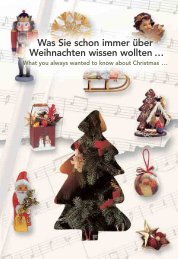Europäische Weihnacht – in Vielfalt geeint - Sutter GmbH & Co. KG
Europäische Weihnacht – in Vielfalt geeint - Sutter GmbH & Co. KG
Europäische Weihnacht – in Vielfalt geeint - Sutter GmbH & Co. KG
Erfolgreiche ePaper selbst erstellen
Machen Sie aus Ihren PDF Publikationen ein blätterbares Flipbook mit unserer einzigartigen Google optimierten e-Paper Software.
Großbritannien/Great Brita<strong>in</strong><br />
well-mean<strong>in</strong>g ghosts is ideal to read underneath the<br />
Christmas tree to children aged eight and older, to<br />
shorten the time until they can unwrap their Christmas<br />
presents.<br />
Dickens was a great friend of Christmas even <strong>in</strong> real<br />
life, so a nice little anecdote tells us. Every year, the<br />
poet <strong>in</strong>vited his best friends to jo<strong>in</strong> him on Christmas<br />
Eve for an opulent Christmas d<strong>in</strong>ner. Once the<br />
goose was on the table and cos<strong>in</strong>ess had fully unfolded<br />
<strong>in</strong> the warm room with foods aplenty on the table,<br />
Dickens got up from his chair, walked to the w<strong>in</strong>dow<br />
and opened it a touch. Steps were then heard outside<br />
<strong>in</strong> the deep snow. A lonely wayfarer obviously was<br />
pass<strong>in</strong>g by <strong>in</strong> the cold night and just as he passed<br />
underneath the w<strong>in</strong>dow he stopped, condemned the<br />
cold and crossed his arms to keep warm before<br />
mov<strong>in</strong>g on, grunt<strong>in</strong>g and groan<strong>in</strong>g. Only after<br />
Dickens had died did his friends f<strong>in</strong>d out that he had<br />
ordered this freez<strong>in</strong>g wayfarer and paid him, to<br />
highlight the homey atmosphere <strong>in</strong>side with this contrast.<br />
The British are equally known for their oddness as<br />
for their eccentric ideas <strong>–</strong> one of which is without a<br />
doubt their famous plum pudd<strong>in</strong>g, the preparation of<br />
which has presumably as many recipes to fall back<br />
onto as the entire works of Dickens have pages. One<br />
particularly elaborate variety is the Christmas Pud,<br />
whose preparation must start no later than on the<br />
first of advent, to ensure that it is ready <strong>in</strong> time for<br />
the Christmas d<strong>in</strong>ner.<br />
When want<strong>in</strong>g to wish friends <strong>in</strong> Great Brita<strong>in</strong> a<br />
“Merry Christmas” by phone, it is best not to do so on<br />
Christmas Day at 3 o’clock (local time) <strong>–</strong> as this is<br />
traditionally the time the Queen’s Christmas speech<br />
is broadcast on BBC. (These days a short version of<br />
the speech can even be received as a text message.)<br />
Those experienc<strong>in</strong>g British Christmas for the first<br />
time might th<strong>in</strong>k that New Year’s Eve is part of the<br />
celebrations. How else to expla<strong>in</strong> the firework-like<br />
popp<strong>in</strong>g which goes back to Victorian days with the<br />
giv<strong>in</strong>g of gifts at Christmas? When tak<strong>in</strong>g a closer<br />
look one quickly realises that these are not fireworks<br />
which explode, but Christmas Crackers, conta<strong>in</strong><strong>in</strong>g<br />
t<strong>in</strong>y tokens <strong>in</strong>side and rolled-up notes with witty<br />
36<br />
little say<strong>in</strong>gs. The great moment for these Christmas<br />
Crackers is right after the actual giv<strong>in</strong>g of the gifts.<br />
Two people hold either end of the crack<strong>in</strong>g crackers,<br />
pull it hard and <strong>–</strong> peng! Surprise! Typically, an<br />
English Christmas carol is sung, such as the one<br />
about the red-nosed re<strong>in</strong>deer. What was it called<br />
aga<strong>in</strong>? Oh yes:<br />
Rudolph, the Red-Nosed Re<strong>in</strong>deer<br />
As eccentric as some of the customs of the islanders<br />
may appear to us cont<strong>in</strong>ental Europeans, they are<br />
surely not eccentric enough to celebrate a box fight on<br />
Box<strong>in</strong>g Day. So why is this day called Box<strong>in</strong>g Day<br />
<strong>in</strong> Great Brita<strong>in</strong>? It is much rather named after the<br />
box <strong>in</strong> which formerly the servants collected their<br />
Christmas bonus on this day.<br />
A shortened formulation of the word Christmas<br />
allows British scrabble® players to rid themselves of<br />
the letter X, which usually is hard to place, not only<br />
at Christmas of course: Xmas. And what is this all<br />
about? Quite simple: X is the first letter of the name<br />
Christ <strong>in</strong> Greek.<br />
A sister of Befana from jItaly roams around England<br />
on January 6: Mari Lwyd, a woman <strong>in</strong> a<br />
white disguise, r<strong>in</strong>g<strong>in</strong>g doorbells, sett<strong>in</strong>g a riddle<br />
and want<strong>in</strong>g to be asked one herself. Those who<br />
can not come up with a smart bra<strong>in</strong>teaser are bitten<br />
by Mari Lwyd and will then have to donate<br />
sweets, fruit and nuts to her. Surely she will not<br />
decl<strong>in</strong>e the leftovers (if any) of the Christmas Pud -<br />
see above.



